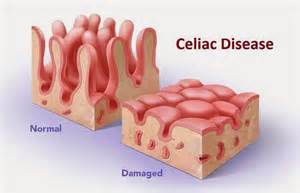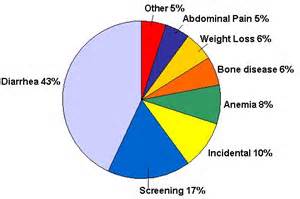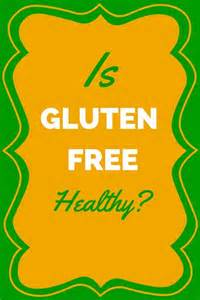Know The Celiac Symptoms
 Do you know the symptoms of celiac disease? I guess a lot of people may not. The objective of this article is to make more people aware of the symptoms so that they can take corrective action steps if they are experiencing any of these symptoms or observe any of them in other family members or friends. This is an important question and needs to be answered.
Do you know the symptoms of celiac disease? I guess a lot of people may not. The objective of this article is to make more people aware of the symptoms so that they can take corrective action steps if they are experiencing any of these symptoms or observe any of them in other family members or friends. This is an important question and needs to be answered.
Celiac disease is an autoimmune disorder that damages the lining of the small intestine when gluten is consumed. It may cause abdominal pain, diarrhea, and eventually diminish the ability to absorb nutrients from foods being consumed.
If not treated, it may also cause long-term health complications such as anemia, liver disease, and cancer of the intestine and other diseases. There is no cure for celiac disease other than to stop eating gluten and going on a gluten free diet.
Common Celiac Disease Symptoms
Here is a great video on some of the symptoms of Celiac Disease:
Symptoms of celiac disease will vary from person to person. Below are some and most common ones and some of these are visible to the naked eye:
- Iron-deficiency anemia
- Fatigue
- Bone or joint pain
- Arthritis
- Osteoporosis
- Depression or anxiety
- Tingling or numbness in the hands and feet
- Seizures
- Missed menstrual periods
- Infertility or recurrent miscarriage
- Canker sores inside the mouth
- Dermatitis herpetiformis (itchy skin rash)
 Chronic and sustained damage to the intestines caused by celiac disease can result in the malabsorption of nutrients from the foods being consumed. This is common in children and adults. Some of the complications associated with malabsorption include:
Chronic and sustained damage to the intestines caused by celiac disease can result in the malabsorption of nutrients from the foods being consumed. This is common in children and adults. Some of the complications associated with malabsorption include:
- Bruising easily
- Depression or anxiety
- Fatigue
- Hair loss
- Itchy skin
- Mouth ulcers
- Muscle cramps and joint pain
- Nose bleeds
- Short stature
If you should notice any of these symptoms this may be a clue that the individual may have celiac disease. Consult your physician to have tests done to determine if the person actually has celiac disease. Also, be sure to remove gluten from the person’s diet.
Symptoms of Celiac Disease in Infants and Young Children
As a parent of a young child or infant you can determine if any of the following signs are present:
- Abdominal bloating and pain
- Chronic diarrhea
- Vomiting
- Constipation
- Pale, foul-smelling, or fatty stool
- Weight loss
If you should see any of these signs, be sure to contact your pediatrician or doctor at once.
Malabsorption of Nutrients in Infants and Young Children
 Children with signs of celiac disease will show some malabsorption of nutrients of the food they consume. Here are some of specific signs to look for:
Children with signs of celiac disease will show some malabsorption of nutrients of the food they consume. Here are some of specific signs to look for:
- Failure to thrive
- Delayed growth and short stature
- Delayed onset of puberty
- Dental enamel defects of the permanent teeth
If you detect any of these conditions, consult with your physician or pediatrician at once.
Diagnosis Tests
More doctors are now becoming aware of individuals being allergic to gluten or may have celiac disease. Your doctor can perform the following tests to determine if you or your child or anyone in the family has celiac disease.
- Comprehensive Physical Exam – Your doctor asks about your symptoms and medical history.
- Blood Test – This test can detect if certain anti-tissue transglutaminase or anti-endomysim antibodies are elevated. These antibodies are produced when people with celiac disease eat gluten. Celiac disease is hereditary and other family members may also need to be tested.
- Intestinal Biopsy – An intestinal biopsy can assess if there is damage to the villi in the small intestine.
Cross-Reactor Foods To Avoid
For anyone who has been diagnosed with gluten sensitivity or celiac disease, it is vital that they avoid some of the cross-reactor foods. A cross-reactor is a food that has a protein in it that the persons immune system will attack it as if it was gluten. Even though the reactor foods do not contain gluten and were formerly OK to eat, it is highly recommended that the individuals with gluten sensitivity or has celiac disease not consume them.
The seven cross-reactor foods are listed below in the order of danger to gluten sensitivity by the immune system:
- Milk (dairy products of all kinds)
- Yeast – Brewers & Bakers (anything that lists yeast in the ingredients)
- Corn
- Oats
- Millet
- Rice
- Instant Coffee
Note: Not every gluten sensitive person will experience a cross-reaction to all of the above foods. However, if you have been diagnosed with celiac disease or gluten sensitivity, it is best that all of the above cross-reactor foods be avoided in ones diet.
Sources of Hidden Gluten
Besides avoiding the cross-reactor foods there are some foods that contain some hidden sources of gluten and you need to be aware of them.
Below is a list of hidden gluten foods:
- Bouillon Cubes – May contain GMO’s and other hidden sources of gluten
- Candy – May be dusted with wheat flour to prevent the candy from sticking in the wrapper
- Cheese spreads
- Canned Soups
- Chocolate – May contain malt flavoring
- Cold cuts, wieners, and sausages – May contain some gluten cereal fillers
- Detergents
- Dry sauce mixes
- Face Powder
- Glue on Envelopes
- Glue on Stamps
- Hairspray
- Lipstick
- Lotions
- Makeup
- Maltadextrin
- Medications & Vitamins
- Modified Food Startch
- MSG’s
- Packaged Foods (Be sure to read the label carefully for hidden gluten ingredients)
- Pet Food
- Playdough
- Salad Dressings
- Shampoo
- Toothpaste
Always check with the manufacture to be sure the product is gluten free before buying.
Conclusion
As a parent or guardian, if you should observe if any of these signs appearing in your child, consult your physician or pediatrician. Before placing yourself or your child on a gluten-free diet, it is mandatory that you know up front that the problem was caused by eating of gluten.
If a healthy person eats gluten-free food it will not harm them as they willget the same nutrition as the person who is required to eat gluten-free food. One must be sure that the nutritional values, vitamins and minerals, in the foods being ingested are sufficient for all members of the family whether they can eat gluten or must be on a gluten-free diet.
You may want to check out our article on fibromyalgia and a gluten free diet.
Back to Top of Page
Shop Symptoms of Celiac Disease Resources
Go back to the gluten free diet with nutrition home page.